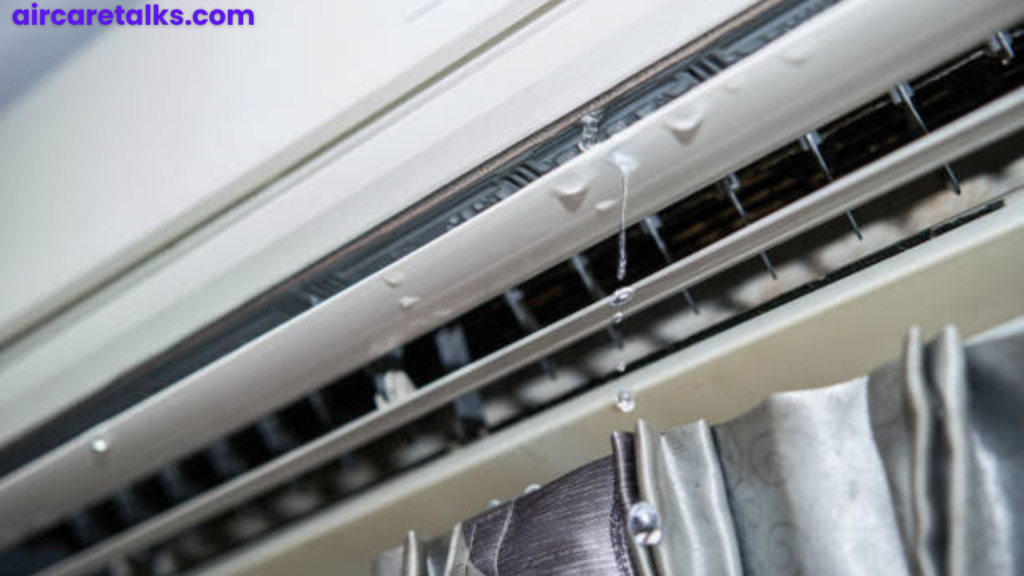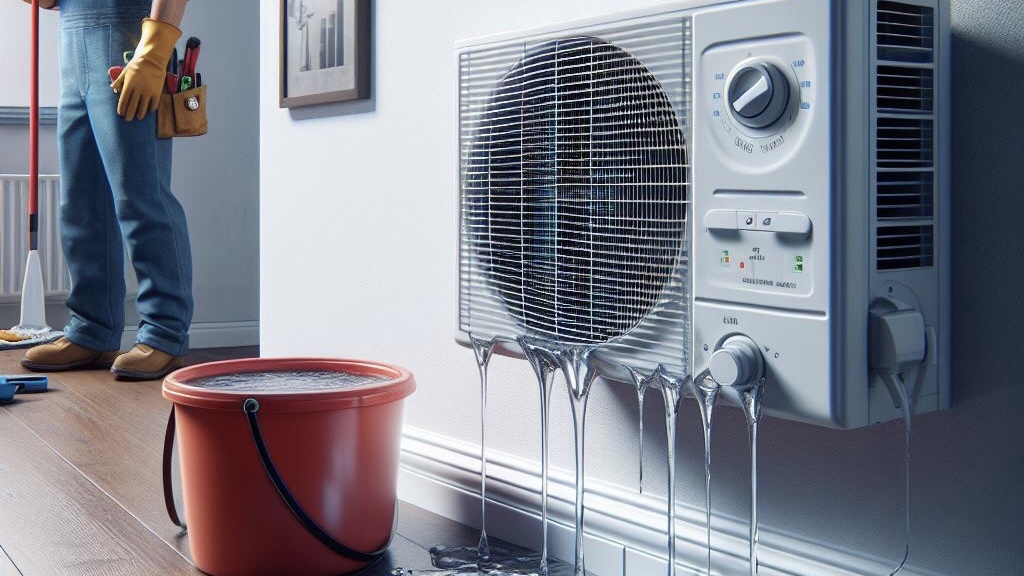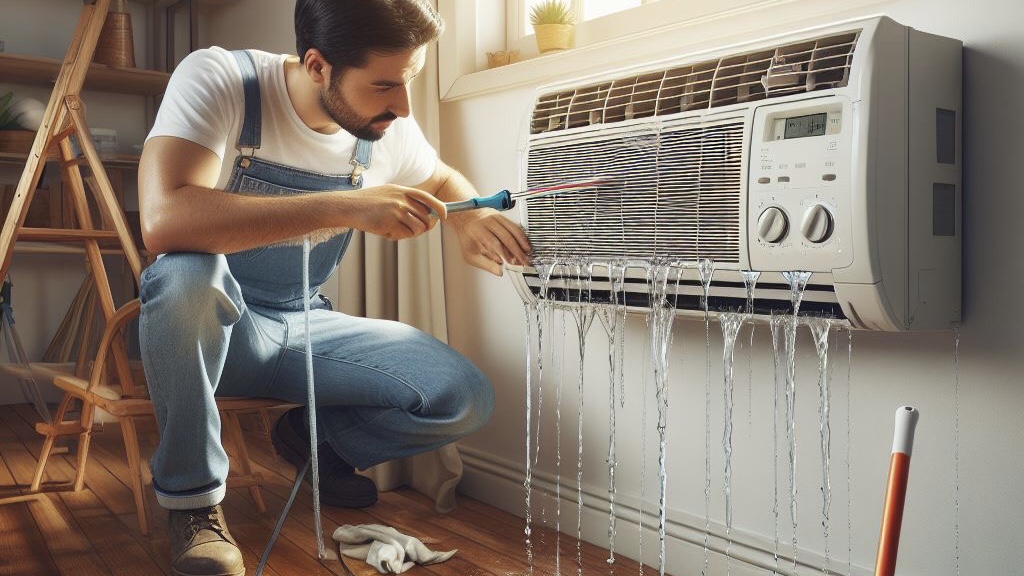
Why is my window air conditioner leaking water? | Sometimes the first thing people think to do when they see their window AC leaking water is to pick up the phone and call an expert. Actually, some condensation from your air conditioner is normal and even expected in some situations.
For example, if the thermostat is set to a low temperature and the weather is extremely hot and humid, the unit will create some condensation as it will be working very hard to cool your home
Contents
Overview of Window Air Conditioner

Warm air is circulated through a set of evaporator coils by an air conditioner, which cools it.
The extra moisture condenses and turns into water because cool air has a lower moisture content than warm air.
The process that creates rain is essentially the same. Certain units use a tube to direct the water to the housing’s exterior.
In others, the compressor is cooled by the blower pushing water against it. Water eventually trickles into a pan at the bottom in both situations.
Reasons – Why is my window air conditioner leaking water?
1. Condensation drain blocked.
A clogged condensation pipe is a very common reason why water leaks from a window air conditioner.
Condensation from the overflow pan is to be drained to the drainpipe via the condensation pipe.
Thus, water will back up and flood if this line becomes clogged with debris, sludge, mold, or other materials.
A clogged condensation drain is more likely to occur in older AC models because some newer models will turn off the unit automatically if it senses overflow.
2. Condensate pan damage.
It is possible that the drain pan on an older air conditioning unit is corroded or rusted and is leaking water.
Condensate pans are simple to inspect on your own and are usually found beneath the air conditioner.
Just use a flashlight to check it for cracks, holes, or corrosion.
3. Low levels of refrigerant.
Low refrigerant levels will similarly lower the overall pressure in the AC unit and cause the evaporator coil to freeze, much like the cause and effect of a dirty air filter.
Therefore, when it melts, extra water overflows the drain pan and may cause flooding.
This could be the reason why your window air conditioner is leaking water.
Low refrigerant levels can occasionally be fixed, but frequently they are a sign that your entire unit needs to be replaced.
4. Condensate pump broken.
There will be a condensate pump that directs the water outside for homeowners who have their furnace or air conditioning system installed in the basement.
The source of your AC unit’s leak may be this damaged or improperly installed pump.
Should that be the case, it will require repair or replacement.
5. Dirty air filters.
The evaporator coil may freeze over if air filters become overly clogged, preventing airflow over it.
Your window air conditioner may be leaking water because of the melting material, which could pour too much water into the pan and flood it.
It’s crucial to replace your air filter on a regular basis—every few months.
It is advised to check it more frequently, every two weeks, during the summer.
How To Fix a window AC Leaking Water

1. The air filter should be cleaned or replaced
If ice is visible, the issue might be resolved by cleaning or changing the air filter.
The majority of filters are cleanable. If so, use a sponge to scrub the dirt off while running water from the faucet.
Place the filter back in and turn on the unit after letting it dry while the ice on the coils melts.
Contact a service technician to refill the refrigerant if the coils ice over once more.
2. Make sure the drain hole is clear.
A window unit’s drain pan has a hole in one of the exterior corners that could get clogged.
Pull back or remove the skirting on one side of the unit and reach through the opening to gain access to it.
To open the hole, remove any loose debris and insert a screwdriver through it.
3. Fix or swap out the drain pan.
If water is dripping from any part of the drain pan on an older air conditioner, it is most likely rusted and may need to be replaced.
Epoxy putty can be used to try and seal a single hole if it is accessible.
4. Make sure the drain tube is clean.
There could be a blockage in the drain tube that goes from the evaporator coils to the housing’s exterior.
Locate this by consulting your owner’s manual, then use a long, thin tool—like a sewing needle—to clean it.
To accomplish this, you might have to take off the external housing cover.
If the air conditioner is installed in a high window, either move the unit indoors or open the window far enough to reach the cover.
5. Modify the inclination
A newly installed window air conditioner is most likely not tilted enough toward the outside if it leaks onto the floor.
Make sure the pan is installed inside the unit at the correct angle by consulting the manual before making any adjustments.
The air conditioner ought to be positioned in the window at eye level in that scenario. If not, it ought to lean in the direction of the exterior.
To check it, use a torpedo level. Should the AC need to tilt outward, use thin plastic or wood pieces to shim up the front until the bubble crosses the centre line by 25%.
Conclusion
Drainage systems on window air conditioners send the water outside.
Usually, when the unit leaks onto the floor or windowsill, it’s because of a malfunctioning drainage system.
The majority of the time, drainage issues are self-repairing.
Freezing evaporator coils can also cause dripping; this is typically a simple fix. Recharging an older unit that may be running low on refrigerant could end up costing as much as buying a new air conditioner.
It’s best to have an HVAC repair company inspect your AC unit if you’re not sure if the condensation it’s producing is normal or if it’s leaking excessively.
Generally speaking, condensation should only form on your air conditioner when it is operating.